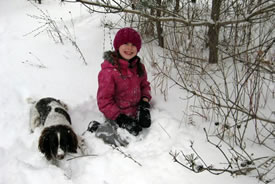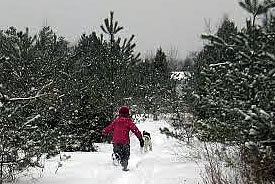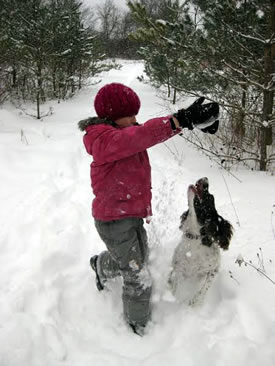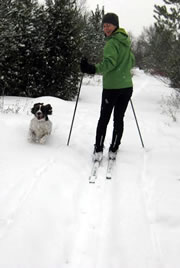A return to the land: What my daughter is learning from a childhood in nature

Grace and Pepper enjoying a fresh snowfall (Photo by Elke Meyfarth/NCC staff)
There’s been a lot of buzz in recent years about the importance of giving children the opportunity to connect with nature. I wholeheartedly agree, and I think we need to remember just how important that connection is for ourselves as well. Everybody, young and old, benefits from experiencing nature.
Ten years ago I bought 100 acres (40 hectares) of land in Eastern Ontario. A lot has changed in my life in the past decade, but the one constant through all the ups and downs has been the land. It is my home and my haven, and not a day goes by that I don’t walk (or, at this time of year, ski) the trail and feel thankful for living in such a wonderful place. Sure, I might grumble a bit while stumbling through the snow to the woodshed on cold and dark winter mornings, but overall I can’t imagine a better place (or a better way) to live. Even in winter, there is beauty and life everywhere I look.
My family overseas is amazed by the size of the property, and often joke: “If you owned that much land here, we’d have to call you Lady.” I too am amazed, for despite 10 years of daily walks, there are parts of the property that I haven’t yet explored and I still see new things everyday. With woods, fields and wetlands, we have quite a diverse property here. Fisher, marten, owl, heron, coyote, deer, mink, wild turkey, partridge, snowshoe hare, beaver, muskrat, toad, snake, newt...I never know just what I might see!

Grace and Pepper exploring the winter wonderland (Photo by NCC)
I love that my daughter is growing up with wildlife as a part of her daily life and with all the room to roam and freedom a kid could want. She’s definitely an animal lover, and she’s also well aware of the circle of life. She understands that some animals die so that others can live, and she’s not squeamish about death (she can look at a dead hare and declare it to be beautiful). We get eggs from our neighbour’s chickens and sometimes those chickens get eaten by a fox — bad for the chickens, but good for the fox.
She might get a bit sad when we cut down a tree, but she knows that we need wood to keep us warm in the winter. She understands the disappointment of coming home to find our entire vegetable garden eaten by deer, and the triumph of building a new (fenced!) garden that gives us food well into winter. She’s in touch with where our food and fuel come from in a way that many kids have to be taught. Here, we just live it.

Grace is definitely an animal lover, and she’s also well aware of the circle of life. (Photo by Elke Meyfarth/NCC staff)
Grace also understands the importance of meaningful work. I consider myself extremely lucky to have a job where what I do so perfectly matches how I live. I view my work (as the Nature Conservancy of Canada’s (NCC's) national manager of property science and planning) as an extension of my stewardship of our property to the stewardship of many many similar properties across Canada. Nature is such an important part of my daily life, and knowing that my work is helping to both protect nature and to increase people’s opportunities to experience nature as part of their everyday lives too...Well, that brings me a great sense of satisfaction and purpose.
I’m not just working so that I can pay the bills that allow me to continue living here in my own little bit of nature; I’m working to give everyone a chance to make nature part of their daily lives too. It doesn’t get better than that!
Of course not everyone is lucky enough to live on 100 acres, but there are lots of ways to bring nature into your daily life. You can listen to songbirds as you walk or cycle to work, take a stroll through a park on your lunch break or just sit on a bench and let the sun shine on your face for a while. If you have a yard at home, plant a garden, put up a bird feeder and give yourself some time every day to watch and enjoy your own little piece of nature. On the weekend, take a short day trip for a hike or a picnic.
Did you know that many NCC properties are open to the public? You’ve helped us to protect them, so why not come out and enjoy them? Make nature part of your daily life. You’ll be glad you did!


